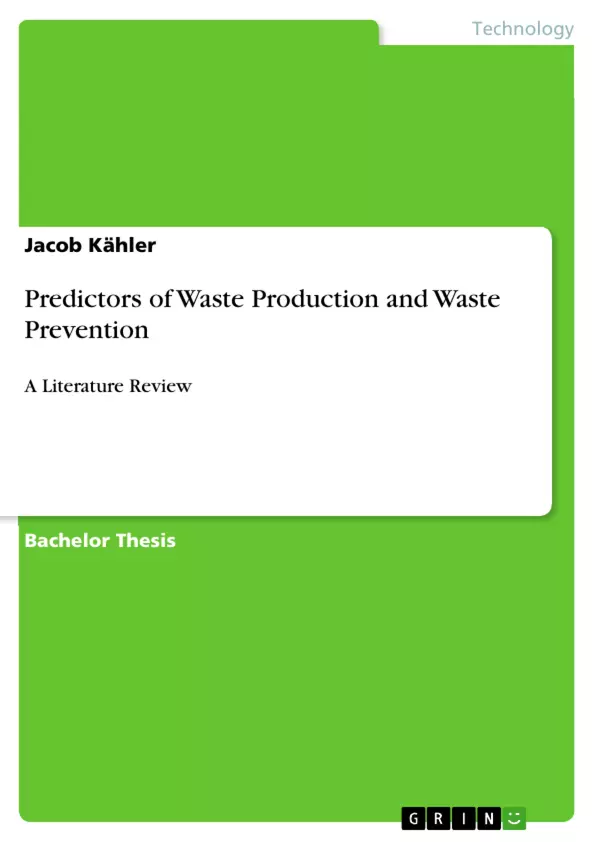Rising amounts of global waste pose a threat not only to the environment, but also for social inequalities and poor health. Exploring predictors of waste production on an individual level is therefore of high importance. There is a conglomerate of factors predicting waste production, such as income level, gender, pro-environmental orientation, individual’s education, urbanity level, availability of disposal facilities, waste pricing and level of knowledge on waste management. This literature review focused on price interventions, which charge waste depending on how many units are produced rather than a flat fee. 21 studies were selected through the online research platforms EBSCOhost®, Universitätsbibliothek der Fernuni Hagen as well as through research in articles' reference lists.
When prevention is exhaustively used or not possible, recycling gains importance. Recycling does not only have a positive effect on public health and environmental pollution, but plays a significant part in economical and other environmental terms as waste can be a resource as well. Demand for aluminium, cobalt, copper and nickel exceeds available supply and is therefore pricey, especially considering the rising impact of climate change and the transition to climate-friendly societies with solar cells, electric vehicles power storage systems, which all rely on rare materials. The last stage is disposal with the aim is to ensure an adequate discarding of remaining waste. An effective waste management, thus, has a direct impact on public health as well as on environmental pollution and resource availability.
Individual waste production makes up a quarter of total waste produced, with cosntruction & demolition (36%) and industrial (21%) being the other two major sources. Hence, reducing the individual production of waste can have a substantial impact on total waste amounts. If one adds the stages waste prevention, which alone has the potential to reduce greenhouse gas emissions by 5%, and recycling to the equation, the impact becomes even stronger. Therefore, this literature review will focus on factors predicting waste production and avoidance, which influence all five stages in the waste hierarchy.
Inhaltsverzeichnis (Table of Contents)
- 1 Introduction
- 2 Theoretical Background
- 2.1 Definition of Waste
- 2.2 Predictors
- 2.3 Hypotheses
- 3 Methodological Approach
- 3.1 Sources and Exlusion Criteria
- 3.2 List of selected studies
- 4 Results
- 4.1 Study Analyses
- 4.2 Evaluation of Hypotheses
- 5 Discussion
- 5.1 Main Results
- 5.2 Weaknesses and Limitations
- 5.3 Political Actions and Implications
Zielsetzung und Themenschwerpunkte (Objectives and Key Themes)
This bachelor thesis reviews the literature on factors that predict individual waste production and waste avoidance. The main objective is to analyze the effectiveness of unit-based pricing systems in reducing waste. These systems charge residents for their waste disposal based on the amount of waste generated, rather than a flat fee.
- Predictors of individual waste production
- Effectiveness of unit-based pricing systems
- Influence of pricing strategies on waste reduction
- Environmental and social implications of waste management
- Policy recommendations for sustainable waste management
Zusammenfassung der Kapitel (Chapter Summaries)
The introduction highlights the global waste crisis and its consequences, emphasizing the urgent need for waste reduction strategies. The theoretical background provides a framework for understanding waste production, exploring factors such as income levels, gender, and pro-environmental attitudes. It also outlines the hypotheses investigated in the review.
The methodology section details the research process, including the sources used and exclusion criteria applied to select relevant studies. The results chapter presents an analysis of the selected studies and their findings regarding the effectiveness of unit-based pricing systems in reducing waste.
The discussion chapter summarizes the main findings, including the strengths and limitations of the research. It concludes with policy implications and recommendations for promoting sustainable waste management practices.
Schlüsselwörter (Keywords)
The core concepts and terms examined in this review include waste predictors, unit-based pricing, weight-based pricing, pay-as-you-throw (PAYT), waste management systems, and sustainable waste management.
Frequently Asked Questions
What factors predict individual waste production?
Key predictors include income level, gender, pro-environmental orientation, education, urbanity level, and the availability of disposal facilities.
What is unit-based pricing in waste management?
Also known as "Pay-As-You-Throw" (PAYT), it charges residents based on the actual amount of waste they produce rather than a flat fee.
How much impact does individual waste have on the total amount?
Individual waste production accounts for approximately one-quarter of the total global waste produced.
Why is recycling critical for modern technology?
Many climate-friendly technologies like solar cells and electric vehicles rely on rare materials (cobalt, copper, nickel) whose demand exceeds supply.
Can waste prevention reduce greenhouse gas emissions?
Yes, waste prevention alone has the potential to reduce global greenhouse gas emissions by up to 5%.
- Quote paper
- Jacob Kähler (Author), 2023, Predictors of Waste Production and Waste Prevention, Munich, GRIN Verlag, https://www.grin.com/document/1403246



